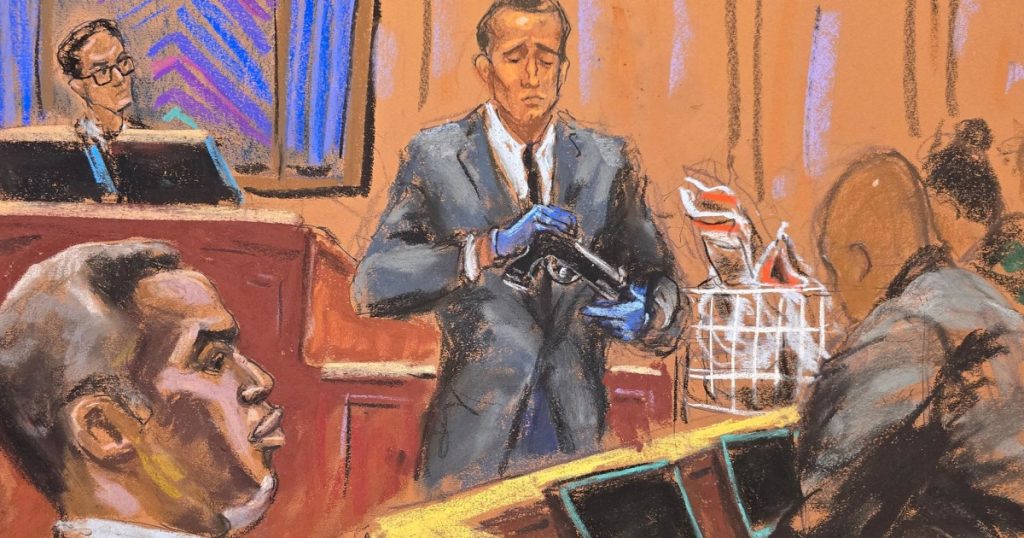This is a free article for Diddy on Trial newsletter subscribers. Sign up to get exclusive reporting and analysis throughout Sean Combs’ federal trial.
Cassie Ventura isn’t on the stand this week, but her testimony still looms over the proceedings. Today, federal prosecutors called witnesses seemingly meant to bolster her account of drug-fueled “freak offs” and years of domestic abuse. In the weeks ahead, prosecutors are expected to link her story to their wider sex trafficking allegations against Diddy.
Today’s key moments:
Gerard Gannon, a federal agent who planned the search at Diddy’s Miami home last year, walked jurors through photos of items seized at the property, including cellphones stuffed in a Balenciaga boot, a Gucci bag filled with drugs (such as ketamine and MDMA), dozens of bottles of lubricant and a .45-caliber handgun in a red suitcase. Dawn Hughes, a clinical and forensic psychologist, told jurors that victims of domestic violence often stay with their abusers and sometimes delay disclosing what they have experienced. The prosecution called Hughes to rebut the defense’s suggestion that Cassie (and other women) could have left Diddy. George Kaplan, a former assistant of Combs’ who was granted immunity to testify, told jurors that Diddy “threatened” his job on a monthly basis. Kaplan said he brought “supplies” to hotel rooms — candles, baby oil, lubricant. He was expected to tidy up after Diddy’s stays, and it was “implied” that his role was to protect the rapper’s image, he said.
The view from inside
By Adam Reiss, Chloe Melas and Katherine Koretski
Two members of Diddy’s defense team were in the spotlight today. Teny Geragos aggressively cross-examined Gannon, suggesting that federal investigators who conducted the search of Diddy’s property in Miami manipulated what they found for the purpose of taking photos and arranged objects in a way that made them look nefarious.
In the afternoon, Jonathan Bach cross-examined Hughes. Diddy sat back in his chair and appeared to be paying close attention during Bach’s line of questioning, which focused on the fact that Hughes hasn’t personally evaluated the key players in the case. Hughes earlier told the court that she wasn’t legally allowed to interview the defendant or witnesses.
Analysis: Expertise or everyday knowledge?
By Danny Cevallos
The government had to limit Hughes’ testimony about why victims remain in relationships, how they cope in such relationships, why they delay reporting abuse and the effect of trauma on memory. She was not allowed to testify to “interpersonal violence,” “coercive control,” or “psychological aggression.” The defense had tried to bar Hughes’ testimony, but it wasn’t successful.
This kind of testimony is often permitted in similar cases, as the government pointed out in its filings. But did the defense have a point? Consider some of the areas of expert testimony from Hughes: Victims often stay in abusive relationships, victims will wait years before reporting abuse, and a trauma bond can make a victim unwilling to leave. Is this specialized knowledge that required expert testimony? Or is it something that is within the average juror’s everyday experience and knowledge?
Hughes’ testimony was a victory the moment the judge decided it was admissible. Hughes isn’t supposed to bolster the testimony of witnesses like Ventura, but that’s effectively what she did.
What’s next
Tomorrow: Kaplan is expected to return to the stand for more direct questioning — and at some point rapper Kid Cudi will testify, too.
PSA: Every night during Diddy’s trial, NBC’s “Dateline” will drop special episodes of the “True Crime Weekly” podcast to get you up to speed. “Dateline” correspondent Andrea Canning chats with NBC News’ Chloe Melas and special guests — right in front of the courthouse. Listen here.


